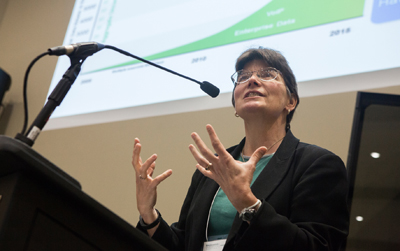
Innovation Day delves into Big Data
Every two days, the world generates as much data as there was in existence until 10 years ago. And while this data has enormous potential, it sometimes feels like we’re drowning in it.
That was just one of the observations shared during the third-annual Innovation Day at Binghamton University. The April event, which drew about 125 participants from industry and academia, focused on Big Data and how it relates to fields ranging from healthcare to finance. The program, organized by the Office of Entrepreneurship and Innovation Partnerships in conjunction with Binghamton’s Center of Excellence, featured plenary lectures and panels as well as tours of the Innovative Technologies Complex and a research poster session.
Katharine Frase, vice president and chief technology officer, IBM Public Sector, discussed a recent IBM survey of CEOs that found a third make decisions based on untrustworthy data and that half lack information they need. At the same time, 60 percent said they have too much data. “This,” she said, “is in some ways the real Big Data problem.”
Although reporting — a major source of Big Data — is important, Frase noted that it’s vital to be “more right, more often.” Reporting can be like driving while looking in the rear view mirror, she said. It’s more interesting, not to mention safer, to look through windshield and see what’s coming.
While experts often discuss intangible benefits of Big Data, it has important implications in the physical world, Frase said. For instance, ConocoPhillips reported $1 billion in savings from accurately predicting ice floes, which resulted in better protection of its oil rigs.
She suggested that data scientists will have the “sexiest job of the 21st century.” These jobs, she said, will require people who have the domain expertise to ask useful questions as well as the math and computer science expertise to put Big Data to work.
“Technology is really good at finding answers,” Frase said, “but the humans ought to be the ones asking the questions.”
For more details about the event, which also featured lectures by Scott L. Zeger, professor and vice provost at Johns Hopkins University, and Hao Wang, vice president of information services and chief information officer of the Research Foundation for SUNY, visit http://discovere.binghamton.edu/news/bigdata-5753.html.







